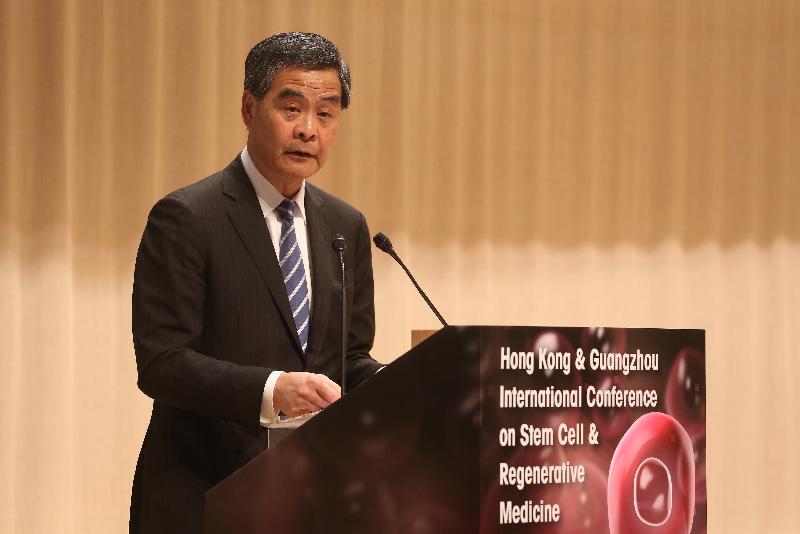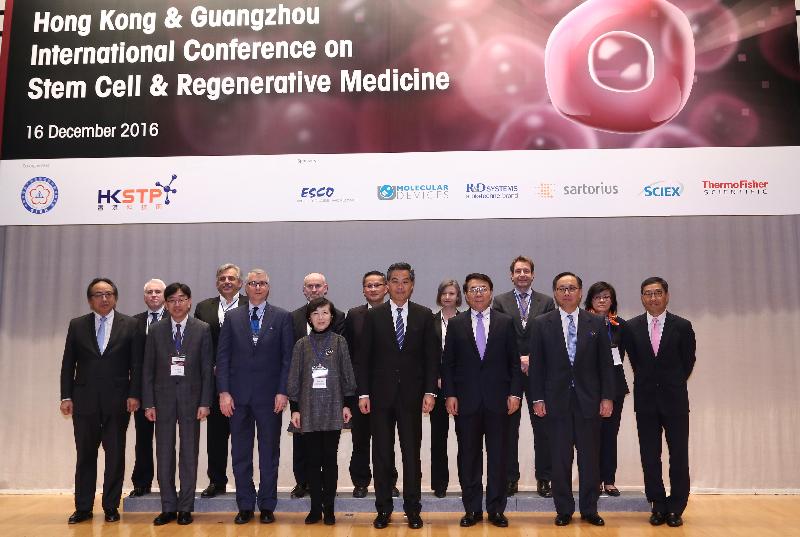Speech by CE at Hong Kong & Guangzhou International Conference on Stem Cell & Regenerative Medicine (English only) (with photos/video)
******************************************************************************************
Fanny (Chairperson of the Hong Kong Science and Technology Parks Corporation, Mrs Fanny Law), Director-General Pei (Director-General of the Guangzhou Institutes of Biomedicine and Health, Professor Pei Duanqing), President Bai (President of the Chinese Academy of Sciences, Professor Bai Chunli), Mr Murphy (Chief Development Officer of the National Academies of Sciences, Engineering, and Medicine of the United States, Mr Michael Murphy), distinguished guests, government colleagues, ladies and gentlemen,
Good morning. I am very pleased to be back in the Science Park again. This is my third visit to the Science Park in about two months. It says something about our commitment to science and technology. I was here, of course, this time last year, for the inaugural edition of this inspiring, international gathering.
Today's conference, which spotlights the promise - the immense promise - of stem cell research and regenerative medicine, features leading scientists and researchers, all working to make a difference.
Stem cell and regenerative medicine is at the frontier of science, boldly going where no research has gone before. In April this year, China launched its first microgravity satellite, the SJ-10, carrying in it 28 research projects. Two of them were related to stem cell research.
Of course, a good deal of stem cell research is trailblazing. Screening new drugs, reducing invasive procedures, developing innovative therapies, mitigating rising healthcare costs - these are all promises of stem cell and regenerative medicine.
And that is why stem cell research has captured the attention, and imagination, of the world. As President Bai can tell you more, stem cell and regenerative medicine is among the major goals of the "Innovation 2020" plan of the Chinese Academy of Sciences.
Here in Hong Kong, we, too, are taking bold steps to harness the vast potential of biomedical research, science, and technology. With the longest life expectancy in the world, Hong Kong certainly stands to benefit from biomedical and regenerative therapies for health conditions such as degenerative diseases.
This Government has put a priority on promoting innovation and technology (I&T) development - including biotechnology. We have set aside over US$2.3 billion on promoting I&T, including a US$250 million endowment to finance mid-stream research in universities. A year after the establishment of the Innovation and Technology Bureau, we are seeing good traction locally and among our international partners.
More and more Hong Kong-based scientists are now engaged in stem cell research. Our universities are setting up dedicated research teams and projects, building GMP stem cell facilities, and expanding collaboration with world-renowned institutes such as Stanford, Harvard and Johns Hopkins University. Some of our universities' cell-based therapy developments are already undergoing or in the pipeline for clinical trials.
Hong Kong Science Park has, of course, become an important base for biotech start-ups and stem cell technology companies - "healthy ageing" happens to be one of the strategic focuses of Hong Kong Science and Technology Parks Corporation. The Ming Wai Lau Centre for Reparative Medicine, one of Science Park's newest members, is a result of collaboration between Hong Kong and the famed Karolinska Institutet of Sweden.
Such distinguished institutions, companies and talent come to Hong Kong for a good reason. We have in place a sound legal system, rich funding sources, a deep pool of talent, and well-accredited research and clinical outputs. Most importantly, we are a place where people and ideas meet, for Hong Kong enjoys the double benefits of "one country" and "two systems" - having strong connections to foreign countries and, at the same time, privileged access to the biggest population in the world. Today's conference is a working illustration of Hong Kong's "super-connector" role - a hub where people interact, ideas flow, and collaboration springs forth.
Hong Kong looks forward to strengthening ties with top overseas and Mainland research institutes, including the Guangzhou Institutes of Biomedicine and Health and the National Academies of Sciences, Engineering, and Medicine, to work together to advance stem cell and regenerative medicine.
I can assure you that the Hong Kong Government is working closely with our scientists, healthcare professionals and enterprises to do just that. Our Health and Medical Research Fund has, so far, supported 18 projects related to stem cell research. The Innovation and Technology Fund has supported applied R&D projects by universities and companies focusing on stem cells. And the Research Grants Council has committed US$33 million for higher education institutions to undertake stem cell and regenerative medicine projects.
Ladies and gentlemen, stem cell and regenerative medicine holds vast potential for the betterment of life. Working together - the Government, the academia, the industry and the community together - we can build that future. Here, in Hong Kong.
My thanks to the organisers for bringing this conference, and you, to Hong Kong. I wish you a rewarding conference, and all the best in the coming year.
Thank you.
Ends/Friday, December 16, 2016
Issued at HKT 11:15
Issued at HKT 11:15
NNNN
Photo
Audio / Video
CE attends Hong Kong & Guangzhou International Conference on Stem Cell & Regenerative Medicine




